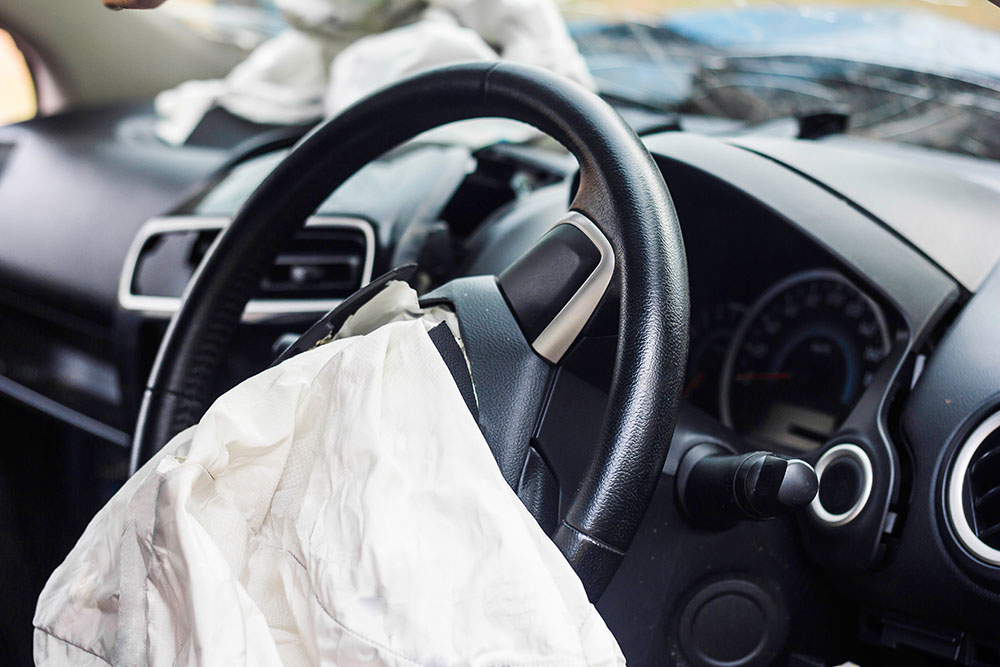Can You Clean Your Car After An Accident?

CONTENTS
- When can you clean your car after an accident?
- Can cleaning your car affect the insurance claim process?
- What should you do before you clean your car?
- What is the best way to clean a car after an accident?
- How to clean the inside of the car after an accident
- When should you involve trauma cleaners?
- Frequently asked questions
- Get in touch
After a car accident, the urge to clean your vehicle might be strong. But, this could have significant implications. Cleaning the car could influence the insurance claims process or place you at risk of exposing yourself to biohazards.
At ICE Cleaning, our trauma cleaning services cover various situations, like road traffic accidents or unattended deaths. We utilise advanced technology and solutions to prevent the spread of bloodborne pathogens, decontaminating large amounts of surfaces where required.
Read on to learn about when you can clean your car after an accident and when professional trauma cleaners become essential.
When can you clean your car after an accident?
Cleaning your car following an accident might seem like the next logical step to take, especially if you are keen on maintaining its appearance.
However, doing so could affect any pending insurance claims or disputes regarding fault. The condition of your vehicle post-accident serves as critical evidence in determining how events unfolded.
It is integral to document the state of your vehicle thoroughly. You can do this by taking pictures, videos, and notes on the state of your vehicle. Insurance companies often rely on this visual evidence when assessing claims.
If liability is under dispute or if there are ongoing investigations by law enforcement or insurance assessors, do not conduct any cleaning until this process is completed.
Can cleaning your car affect the insurance claim process?
Cleaning your vehicle after an accident could alter the evidence needed to assess fault and damages accurately. When cleaning your vehicle before an assessment, crucial details that prove how the incident occurred may be lost.
Insurance companies rely heavily on these details to correctly allocate responsibility and calculate the repair expenses. For instance, skid marks or dents that indicate the point of impact can become less discernible.
What should you do before you clean your car?
You must prioritise your insurance claim process first after an accident. Document the damage to the vehicle with pictures and videos - and a statement from you about what happened will be helpful. You must also provide your insurer with dashcam footage you may have.
Next, secure a comprehensive report from your mechanic or an authorised garage. The document in question must detail every single scratch and dent from the accident, even those lurking beneath the surface, undetectable by someone not versed in auto damage.
A professional evaluation aids in accurate insurance claims and ensures that cleaning efforts do not worsen hidden issues. Lastly, consult with your insurance provider before initiating any cleaning.
They may have specific guidelines or requirements for assessing damage which could be affected by cleaning. Following these steps will protect you against potential complications with your claim while ensuring your vehicle is restored to its pre-accident condition efficiently and effectively.
What is the best way to clean a car after an accident?
If your car is cleared for cleaning by mechanics and your insurance provider, you may begin the process. You should do this by hand and with gentle methods, so you can identify any areas that require a professional touch.
To wash the exterior, opt for a pH-neutral soap that effectively cleans without damaging the paint or finish. A soft microfiber cloth is essential to avoid abrasion, moving in circular motions to lift dirt gently from the surface. Rinse thoroughly with water to prevent soap residue from drying out and staining.
How to clean the inside of the car after an accident
Cleaning your car's interior post-accident requires careful consideration, especially when dealing with broken glass and airbag powder.
If there are traces of blood or you suspect biological hazards might be present, professional cleaning services should be sought immediately. Such situations need specialised handling beyond regular cleaning techniques due to the potential health risks involved.
Once you are certain it is safe to clean, you can begin by hoovering all surfaces thoroughly, using a brush attachment to loosen any particles embedded in crevices or upholstery.
In cases where airbag powder has dispersed you should allow a professional to clean this for you. Airbags contain sodium hydroxide and sodium azide, which can cause skin and lung irritation.
Whilst it is most not harmful in acute exposures, you should exercise caution if it has coated your vehicle's interior.
When should you involve trauma cleaners?
The need for trauma cleaning services arises under circumstances where an accident has led to severe injuries or fatalities. These situations demand a specialised approach due to present biohazardous materials, such as blood and bodily fluids, which pose significant health risks.
Trauma cleaners are trained professionals equipped with the necessary protective gear and cleaning agents designed specifically for biohazard decontamination. Using their skillset, they meticulously eradicate every speck of bio-material, preventing the exposure of dangerous microorganisms.
Engaging these services is crucial when dealing with accidents involving serious injury or death within a vehicle. This not only protects your health but also restores the vehicle's condition in a manner that respects the gravity of the incident.
Frequently asked questions
How long after body repair can I wash my car?
Wait at least two weeks. This gives the new paint time to settle and harden properly.
What are the legal requirements after a car accident?
You must stop, exchange details with other parties involved, and report the incident to the police if necessary.
Who cleans up blood after a car accident?
Specially trained biohazard teams tackle this task as there may be bloodborne pathogens present.
What is inside airbags?
A mixture of sodium hydroxide and sodium azide lines the inside of the airbag to lubricate it as it deploys. This can cause skin and lung irritation.
Get in touch
For trauma clean-up services after a road traffic accident, you can rely on ICE Cleaning. We ensure that all areas affected by a trauma-related incident are decontaminated and cleared of all biohazards, making it a safe environment again.
To learn more about our biohazard cleaning services, contact our team today at 0208 066 0360 or enquiries@icecleaning.co.uk. We can provide discreet and sensitive cleans for trauma incidents across the UK, available 24/7, 365 days a year.

Speak with me today,
I’m here to help
By asking you a few questions either via phone or email I can immediately provide a realistic estimation of the cost.

Why choose us?
- Cater to a wide variety of cleaning situations
- Nationwide coverage, available 24/7
- Cater to commercial and domestic clients
- Free survey provided prior to quotation
- Emergency response team
- Offer a bespoke service designed to suit all your needs
- All technicians hold professional health and safety qualifications, including BICSc, IOSH, Dewpoint Professional & Safe Contractor
We’re fully accredited
We place best practise, professional expertise and health and safety at the core of our business. We’re fully compliant with all legal obligations. You can view a list of our accreditations below, or visit our Health & Safety page for more information.











-RGB-small.1707319151.jpg)




















